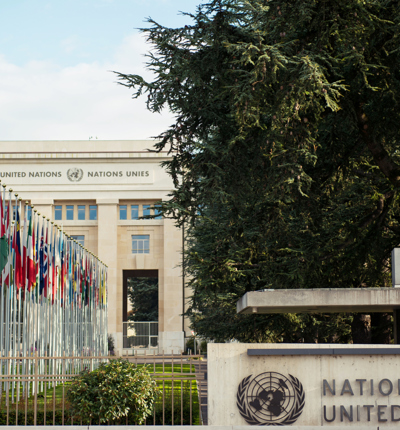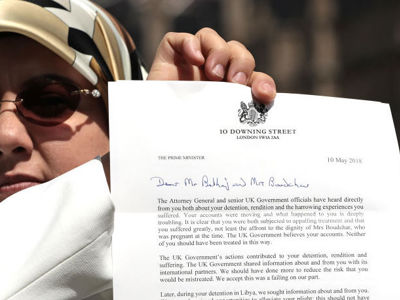
Urgent Action to Eradicate Torture is Needed
On the UN International Day in Support of Victims of Torture, Suzanne Akkawi and Aya Alshekhili from the international department discuss allegations of state complicity in torture and the impact of torture on victims. This blog contains details which some readers might find distressing.
Posted on 26 June 2022
UN International Day in Support of Victims of Torture is a reminder that despite all existing legislation prohibiting torture, it still happens. Will we see an end to this practice? Undoubtedly, if the government takes responsibility for its action.
Prohibition of torture
Torture is illegal in all circumstances and is prohibited under international law. Its prohibition is binding on all states and is so fundamental that it cannot be derogated from. It is what we call a peremptory norm of international law.
Following the Second World War, the European community recognised that it could play a fundamental role in the protection of fundamental human rights and In 1950, the Council of Europe established the European Convention of Human Rights (ECHR).
Article 3 ECHR affirms that “No one shall be subjected to torture or to inhuman or degrading treatment or punishment” and in 1998, the article became enforceable in the UK following the introduction of the Human Rights Act by the Labour government
Freedom from torture is an absolute right, meaning that there can never be any legal justification for the torture, inhuman or degrading treatment of a human being by a public body in the UK.
What is Torture?
In 1984, the UN adopted the Convention Against Torture and Other Cruel, Inhuman or Degrading Treatment or Punishment (CAT), which was ratified by the UK in 1988.
Article 1(1) of CAT defines torture as: “Any act by which severe pain or suffering, whether physical or mental, is intentionally inflicted on a person for such purposes as obtaining from him or a third person information or a confession…”
Torture takes many forms, whether physical, psychological or sexual. The most common forms of torture include (but are not confined to) beatings, waterboarding, electric shocks, sexual humiliation, rape, stress positions, subjection to noise, deprivation of sleep and prolonged solitary confinement.
Complicity in Torture
While there is no clear evidence that the UK government has directly authorised torture or has itself engaged in torture of detainees under the authority of foreign intelligence services, evidence has shown that it has been complicit in the use of torture by others.
Some of the forms of complicity the UK government was allegedly engaged in include the provision of information or questions to foreign intelligence services to be put to a detainee who is being or is likely to be tortured, and/or the receipt of information known or thought to have been obtained from detainees as a result of torture without apparent action to establish its source.
Numerous cases have been brought against the UK government for its alleged involvement in torture and mistreatment. Leigh Day represented many individuals in claims against the UK Government for their apparent role in their rendition and torture overseas.
Leigh Day acted for Mr Abdul-Hakim Belhaj and his pregnant wife, Mrs Fatima Boudchar, who were detained and tortured in a CIA “black site” in Bangkok and then rendered to Libya in 2004. Once in Libya, Mr Belhaj was detained, tortured and was subjected to a flagrantly unfair trial before being sentenced to death. He was subsequently released in 2010. Mrs Boudchar was imprisoned in Libya for four months while pregnant and was released just three weeks before giving birth.
Confidential documents were discovered following the fall of the Gaddafi regime in Libya in 2011, which showed the apparent involvement of the British security services (BSS) in the rendition of Mr Belhaj and his wife.
Proceedings had been issued in 2012 against the UK Government. Following a long legal battle, both Mr Belhaj and Mrs Boudchar received in 2018 an unreserved and public apology from the Prime Minister at the time, Theresa May, for the UK Government’s role in their ‘detention, rendition and suffering’.
Most recently, the Court of Appeal heard the case of Abu Zubaydah, a Palestinian national, who brought a claim in the UK against the BSS for their complicity in his torture. Whilst the question of the applicable law was the focus of the Court in this ruling, the apparent involvement of the UK government in torture has once more been evident.
Mr Abu Zubaydah, who is represented by law firm Bhatt Murphy, alleged that despite the BSS knowledge that he was being arbitrarily detained without trial and being subjected to extreme mistreatment and torture during interrogations conducted by the CIA at secret "black sites" in six different countries, the BSS sent numerous questions to the CIA, to be used in his interrogations for the purpose of attempting to elicit information of interest to the UK, without taking any steps to prevent him being subjected to torture.
The Court of Appeal held that the law applicable to the actions of the BSS in Mr Abu Zubaydah’s case is the law of England and Wales.
Torture in Egypt
Another example of alleged complicity is a case of two dual Irish and Libyan nationals (currently represented by Leigh Day), who are bringing claims for compensation against the UK government for the alleged injuries and unlawful detention they suffered as a result of their detention and torture in Egypt in 2007.
Their claims were issued in the English High Court in July 2021.
Both clients allege the involvement of BSS in their detention and unlawful treatment in Egypt. They contend that BSS shared intelligence with, and sought intelligence from, the Libyan and/or the Egyptian Security Services concerning themselves, which contributed to their detention and mistreatment despite the foreseeable risk that it would do so.
Both clients, Mr XX and Mr YY, left Libya due to their opposition to the Gaddafi Regime and were granted asylum in the Republic of Ireland in the late 1990s.
In July 2007 Mr XX travelled via Heathrow Airport to Cairo, Egypt with his four-year old son. On the morning Mr XX was due to return with his son to Ireland, he was apprehended by Egyptian Police at Cairo Airport. He was detained in a room at the airport with his son for several hours, following which he was transferred to a detention facility, handcuffed and hooded. At no point, then or throughout his detention, was he provided with an opportunity to obtain legal advice or representation.
Prior to the incident, Mr YY had relocated with his wife and children to Egypt. On the same day that Mr XX was detained, the Egyptian National Security personnel raided Mr YY’s apartment at night and arrested him. His wife and children witnessed the raid.
Both clients describe their severe torture, inhuman and degrading treatment during their detention. They claim they were made to strip to their underwear and were electrocuted on several occasions all over their bodies.
Mr XX says he fainted several times, and cold water was thrown over him to wake him up. They describe being beaten up, sleep deprived and were mostly detained in solitary confinement. They were tormented by the screams of other detainees being tortured. Mr YY was also humiliated by being made to use the toilet in front of others.
Shortly following their release both clients were diagnosed with severe post-traumatic stress disorder (PTSD).
Iraq
The UK Government has been scrutinised for its direct involvement in torture and other human rights violations during the Iraq war. The case of Baha Mousa is an illustration of the severity of torture committed by members of the British Armed Forces.
In 2017, Mr Justice Leggatt awarded damages for unlawful detention and inhuman and degrading treatment under the Human Rights Act to four Iraqi citizens (formerly represented by Leigh Day) who were unlawfully imprisoned and mistreated by British armed forces. Subsequently, hundreds of the remaining claims settled.
Four years later, the Secretary of State for Defence (Ben Wallace) gave the following statement in the House of Commons: “I apologise unreservedly to all those who suffered treatment at the hands of UK forces which was unacceptable.”
We welcome this statement and invite the UK government to take an active role in preventing torture both in the UK and overseas.
Impact of Torture
Torture has a long-lasting impact, not only on the victims and their families, but also on the wider community.
The victims’ trauma is often compounded by a wide range of psychological and social difficulties experienced thereafter. Symptoms of PTSD may develop, which include loss of interest of life, withdrawal from people and depression etc. Other difficulties victims may face include guilt and shame for humiliation they endured during their traumatic experience, inability to trust others and inability to form close relationships.
These difficulties not only demonstrate the victims’ struggle to fit in the community, but also may deter them from seeking justice.
In view of the above, the UK Government has an urgent obligation to stop complicity in torture and other human rights violations. It’s all the more concerning, therefore, that this week the government moved forward with plans to replace the Human Rights Act 1998 with a ‘Modern Bill of Rights’, with the potential to reduce avenues for redress for torture victims and their ability to hold it to account.
If you were a victim of torture and you need further advice please contact us.



